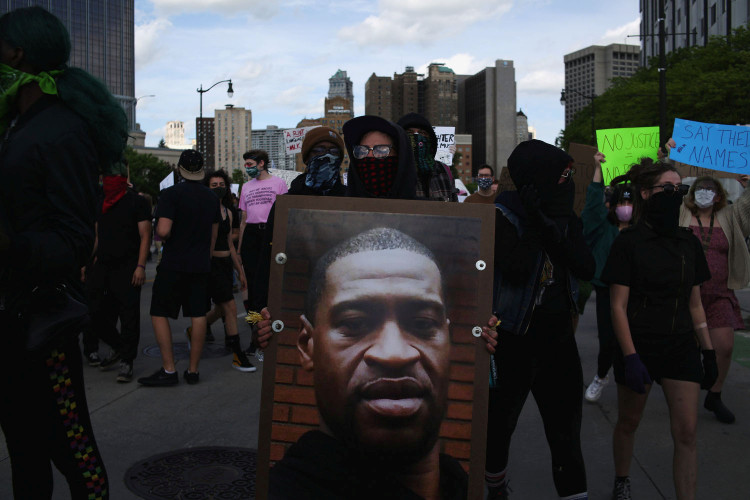Peaceful protests in the United States seeking justice for George Floyd and protesting police brutality have descended into paroxysms of appalling violence, looting and destruction of property.
President Donald Trump has not called for calm and a reduction in tensions. Instead, Trump said he's prepared to meet violence with violence and now threatens to unleash the United States Army onto protestors. The U.S. military has rarely been used against protesting civilians on U.S. soil, however.
"We have our military ready, willing and able, if they ever want to call our military," tweeted Trump Saturday. "We can have troops on the ground very quickly."
Trump came out squarely in favor of using violence against demonstrators in Minnesota by prodding Minnesota governor Jay Walz (D) to be tough and strong, because "they've got to be respected." He said protesters, which have been denouncing Floyd's death since May 26, needed to be "taught" that they "can't do this."
The most infamous misuse of the U.S. Army against American civilians occurred on July 28, 1932 when a U.S. Army force backed by six tanks under the command of Gen. Douglas MacArthur violently dispersed the "Bonus Army" of some 43,000 demonstrators. These people, most of them demobilized and jobless U.S. Army veterans of World War I, had gathered in Washington D.C. at the height of the Great Depression to demand early cash redemption of their service certificates.
State officials, especially in Minnesota, and American media are increasingly blaming outside anarchists and provocateurs for the relentless wave of violence smashing their states. More than 1,700 persons have been arrested across the country since Thursday.
Five days after the first protests erupted in Minneapolis, Minnesota -- where Floyd died May 25 after police officer Derek Chauvin kept his knee on his neck for nine minutes -- the number of street protests are increasing across the U.S. In response, more governors have called out their National Guards to assist local police in restoring order. Minnesota and Florida have deputized their National Guards for law enforcement duties.
Minnesota is deploying 1,700 men of its National Guard after Walz ordered the largest peacetime deployment of this force in its history. Walz said the law enforcement presence in Twin Cities of Saint Paul and Minneapolis will "triple in size" in response to protests.
Walz also expects to see a surge in COVID-19 cases in Minnesota following the rowdy street protests that's seen large numbers of protestors and police confront each other face-to-face.
"I am deeply concerned about a super-spreader type of incident," said Walz, who also acknowledges the state is going to see a spike in COVID-19. "It's inevitable," he said.
The most violent confrontations between protestors and police took place in Los Angeles, California Saturday morning where police fired rubber bullets and swung wooden batons at persons pressing their lines. Organized by Black Lives Matter, the protests began peacefully. Protestors held up signs scrawled with phrases such as "Justice for George Floyd," "I can't breathe," and "Don't shoot." A familiar sight at these protests is groups of protestors kneeling in front of police officers, holding up their hands and shouting, "Don't shoot!"
The protests turned unruly and then violent when some protestors took to taunting police and vandalizing private property. At least a dozen police cars of the Los Angeles Police Department were trashed by violent demonstrators. Two police cars were burned.
New and violent protests struck Chicago, Illinois and Philadelphia, Pennsylvania Saturday. In Chicago, demonstrators heading for the Trump International Hotel & Tower Chicago on North Wabash Avenue were blocked by officers of the Chicago Police Department (CPD). Mounted police were brought in to control the growing masses of protestors numbering into the thousands.
Protests first erupted in Chicago on Friday. The Saturday protests began when hundreds of people massed at Federal Plaza in the early afternoon, again shouting and demanding "Justice for George!" Media reports say most of the protests were peaceful with people carrying thousands of signs declaring "No justice, no peace!" Other carried signs with the names of African-Americans and others that have died at the hands police officers in Chicago and elsewhere.
In other places in the U.S. as of early Saturday evening:
- Almost a dozen governors have activated their states' National Guard. Among these states are Colorado, Georgia, Kentucky, Minnesota, Ohio, Wisconsin, Texas, Utah and Washington D.C.
- More than 70 people were arrested in New York City's protests against police brutality in the killingof George Floyd.
- A number of police officers of the Pittsburgh Bureau of Police were injured in clashes with protestors. Some journalists were hurt, as well. The city entered a curfew 8:30 p.m. ET Saturday evening until 6:00 a.m. Sunday.
- Atlanta Mayor Keisha Lance Bottoms has declared a curfew starting 9 p.m. ET Saturday through sunrise Sunday to restore order after a night of widespread protests and rampant looting.






